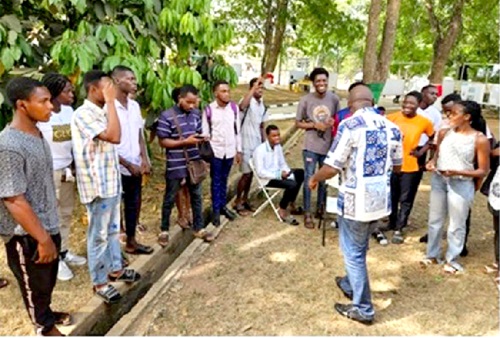
Scaling up youth employability skills through agropreneurship education
Agropreneurship is entrepreneurship undertaken by individuals who have the intention to create wealth by applying creative thinking and innovative skills within the agricultural sector.
At the micro-level, agropreneurship allows the individual to develop creative and innovative means of meeting the growing demand for food whereas at the macro level, it benefits the economy by creating employment opportunities and contributing to the national income of the country.
The realisation is that institutional influence, more explicitly the design, method and structure of agricultural studies programmes, plays a critical and vital role in inducing agropreneurial intention among students of higher learning.
To achieve the desired result through practical and managerial influences, a detailed and holistic agropreneurship curriculum that goes beyond the current theory-based learning must be introduced, monitored and implemented to be impactful in increasing agropreneurial intention among the youths.
These will no doubt open green areas for future exploration and policy implications for efforts geared towards agricultural education, training and agribusiness.
Outside the current trade-based learning, educational systems and government policies should also focus on providing knowledge-based creativity, technical skills and building attributes that young farmers need to boost their agropreneurship career with the mindset that agribusiness is as lucrative as any other business.
Challenges
The present-day youths are not interested in agriculture as it is seen not to be delivering the types of dividends status lifestyles that young people desire and expect today.
The agricultural sector in the sub-Saharan over the years has not been able to deliver the required incomes and working conditions students of the 21st century are expecting, including the kinds of lifestyles young people need and desire.
If agriculture is not able to deliver either the desired living standards or the required prospects, then the probability of attracting young people into the sector or retaining the same will ever remain a dream.
Another factor dissuading students' involvement in agriculture is students' negative perceptions. Youth of today perceive agriculture as an activity or an occupation for people with low quotient (IQ).
In addition, proper and timely information, which is key to any business success is not readily available to the youth as they struggle to access information on agriculture and agribusiness.
Most of the youth are still ignorant of the enormous range of opportunities that abound in the sector.
Furthermore, they lack a holistic view of the concept of agriculture and agricultural entrepreneurship; hence, a myopic view that portrays agriculture from the production side only. An intensive sensitisation and awareness need to be carried on the youth, especially university students.
Strategies for agropreneurship education
Investing in training active rural youth in agriculture is increasingly crucial as the problems of adopting sustainable, climate-friendly agricultural methods and connecting with commercial opportunities in modern value chains become more complex today.
The increasing interest of the government, policymakers and companies in food value chains lately means that there is hope and opportunities for young active people to engage in agriculture today and in the future greater than what it was in the past.
A mentorship and apprenticeship relationship would enable the youth to develop and acquire the relevant and required skills and competencies for agricultural development.
There should be youth voice inclusion in policymaking and debates. Policymakers should always design a strong youth programme for capacity-building and development, as well as all youth-inclusive activities and policies in the agricultural sector.
Identifying appropriate skills and key competencies required of today's young agricultural development professionals is vital as a strategy as most often these theoretically acquired skills do not match those required by employers.
Adjusting the educational curriculum to capture and cover the relevant skills and competencies required for today's job market is, therefore, central.
Role models
Agricultural success stories by the youth, including profiles and successful stories of young, active agricultural professionals who have performed creditably well in agribusiness, should be made public to serve as a source of encouragement to others who have myopic views concerning agribusiness.
It is noteworthy that the training needs of young active rural people, especially those who need to develop skills and capacities to participate in creative, productive, profitable, and sustainable agribusiness, have to be systematically incorporated into the education, vocational and training agendas.
As a result, many vibrant youth would see agriculture as a viable and attractive option.
Policy recommendations
The youth groups and young farmers should be trained, supported, strengthened and encouraged to go into agribusiness, which could lead to agricultural transformation and economic growth.
The government should provide the needed funds and land for meaningful agricultural practice as this will help build the agribusiness mindsets of young graduates in Ghana.
Universities' curriculum should be more practical than theoretical in the teaching and learning of agriculture and entrepreneurship in educational institutions thereby attracting the youth for early career development.
Resource persons and extension officers should be invited frequently to groom the youth on the agricultural value chain and other untapped opportunities inherent in agriculture.
With this, young graduates will have a rethink towards agricultural businesses in Ghana.
The writer is the Registrar of the Chartered Institute of Agriculture, Ghana.
Email:
